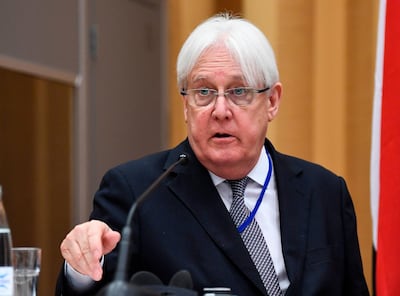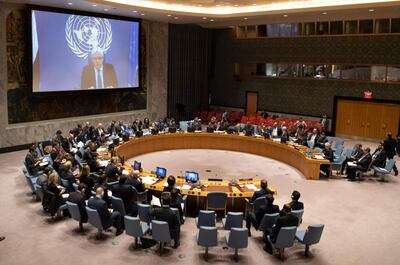The UN's special envoy for Yemen said on Friday that a strong system for monitoring an agreed ceasefire in the Red Sea port city of Hodeidah, the main achievement of eight days of peace talks in Sweden, must be established in the coming days.
The ceasefire, Martin Griffiths told the UN Security Council, is only one step forward but it and other developments during the first face to face negotiations between Yemen's government and Houthi rebels do signal a path to ending more than three years of war.
His comments came as diplomats at the UN said they were preparing a new Security Council resolution to enforce the ceasefire, which does not apply to the rest of the country.
The peace talks had barely ended on Thursday night when attacks from rebels in the south of Hodeidah highlighted how hard bringing an end to the fighting there may be.
Mr Griffiths, addressing the Council via video link from Amman, said: “A robust and competent monitoring regime is not just essential, it is also urgently needed. And both parties have told us they would welcome it.”

Hodeidah, the landing point for much of the country's imported goods, dominated the talks in Sweden. The humanitarian situation in Yemen has deteriorated in recent months.
“Allowing the UN the lead role in the ports is the vital first step,” said Mr Griffiths. “We must see this happen within days.”
The UN is to work with local officials in Hodeidah and the country's other Red Sea ports of Salif and Ras Issa, under the document agreed between Yemen's government and the rebels, in Rimbo, Sweden, on Thursday. Doing so should allow more ships carrying aid and essential goods to land.
Under the ceasefire, the UN said armed forces from both sides must withdraw within 21 days at the most. Hodeidah should instead come under the control of local forces. Humanitarian corridors are also to be established and monitored by the UN.

“This is a humanitarian stop gap to save lives and turn the tide of war towards peace,” Mr Griffiths said. “I also come before you today with a call for caution. Our collective achievements this week were a significant step forward. But what's in front of us is a daunting task.”
Minutes before he briefed the Security Council diplomats said they were seeking to put together a plan that can put the ceasefire into effect.
“We see a glimmer of hope,” Karel van Osterom, the permanent representative of The Netherlands, a member of the Council, told reporters in New York.
“We have been pushing for progress but the situation on the ground is still one of utter desperation. We feel very strongly we need a resolution as soon as possible.”
Maintaining any ceasefire in Hodeidah likely means UN involvement but Mr van Osterom said it was “too early” to say if that would involve a Blue Helmet force being deployed.
“Very soon we need to have... someone on the ground to do a recce,” he said, calling for the Security Council resolution to be put together early next week if possible, “but certainly before Christmas”.
Mr Griffiths addressed the Council for 20 minutes. The UN's humanitarian aid and relief chief, Mark Lowcock, who this week returned from an extended trip to Yemen, spoke to members immediately afterwards.
“I got a glimpse of what life is like in the world's worst humanitarian crisis. A terrible tragedy is unfolding in Yemen. And it is getting worse. Millions of people are starving, sick and desperate. They have one message for the world: this war needs to stop,” Mr Lowcock said.
_______________
Read more:
[ Rebels continue attacks after Hodeidah peace deal announced ]
What we know about the Hodeidah ceasefire
[ UAE welcomes breakthrough in Yemen peace talks ]
A lonely fight for Yemen’s only female delegate to UN-backed talks
_______________
The UN's latest survey shows that more than 20 million Yemenis – two thirds of the population – are food insecure, over 10 million of them severely so.
Battles have made safe passage for aid deliveries extremely difficult given a vast array of front lines. Despite the declared ceasefire Houthi fighters attacked a village in southern Hodeidah, forcing dozens of families to leave their homes late on Thursday.
Speaking in New York before Friday's Security Council meeting, Olof Skoog, Sweden's permanent representative to the United Nations, said the peace talks hosted by his country “can be a breakthrough but most important was the ceasefire in Hodeidah” and the need for UN monitoring.
“Our efforts must be to the implementation,” he said. “The Council should now come together to support that agenda.”




